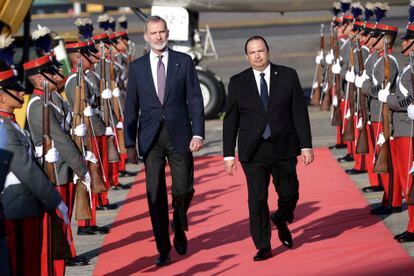Bernardo Arévalo's race to become the President of Guatemala has been so complicated that this Sunday, the day on which he, his vice president, Karin Herrera, and the elected deputies are scheduled to be sworn in, there is still a lot of uncertainty regarding possible new last-minute obstacles. The presidential inauguration ceremony was scheduled for three in the afternoon (local time), but it is likely to be delayed a few hours after the session of Congress in which the new deputies were to be sworn in has stalled amid tensions . Meanwhile, citizens and international delegations close ranks to support the president in his inauguration and guarantee the transfer of power.
Among the international delegations that are accompanying Arévalo in Guatemala today are a dozen Latin American presidents, including the Chilean Gabriel Boric, the Honduran Xiomara Castro and the Colombian Gustavo Petro, who has been especially critical of the attempts to hinder Arévalo's inauguration. by the Public Ministry. “I request all the heads of state of the republics of America to attend the inauguration of President Arévalo in Guatemala,” he wrote on Saturday on his X account. “There are forces threatening a coup d'état. Our solidarity is fundamental.” do. The best is yet to come”.
After his surprise victory in the August elections with his promise to combat the corruption that has corroded Guatemala, this 65-year-old sociologist, former congressman and diplomat has had to face a string of judicial processes that he himself denounced as an attempted “coup.” of State” promoted by the Public Ministry to try to prevent his coming to power and disqualify his party. And although a ruling issued by the Constitutional Court in mid-December offered guarantees for his investiture this Sunday, no one in this country rules out last-minute surprises to try to hinder the swearing-in. “We don't know if legally they can come up with something absurd,” Arévalo told EL PAÍS this Saturday. “So we will be waiting, but with the confidence that in the end that is not going to change the result or the fact that we are going to take possession.”
The day began with a delay in the session of a Congress in which the board of directors had to be appointed, while the Constitutional Court (CC) resolved several appeals, including one presented by the ruling Semilla Movement, which will be the third largest force in the chamber, to determine if they could be part of the candidates to preside over it after the temporary disqualification of the party. The provisional protection was rejected, so elected deputies will have to take office as independents and will not be able to be part of the presidency of that body.
The support of the population and international delegations
In the session of Congress there have also been moments of tension during the session of qualification of deputies' credentials. After 2 in the afternoon (local time), there is a delay in the appointment of the board of directors compared to the scheduled time and it is feared that this could hinder the process of transfer of power.
According to the transmission of command program, the swearing-in and inauguration of Arévalo and Herrera is scheduled for 3 in the afternoon at the Miguel Ángel Asturias Cultural Center in the capital, where a dozen Latin American leaders and the King of Spain will attend. , among other international delegations. Already wearing the presidential sash, the new president plans to give a speech to Guatemalans in the Plaza de la Constitución, the place where the Semilla Movement was born in the heat of the anti-corruption protests of 2015.
Supporters of the new Government and representatives of indigenous peoples from all over the country began to move to the square. 105 days ago they held a sit-in in front of the Public Ministry to demand the resignation of their boss, Consuelo Porras, whom Arévalo has accused of being at the forefront of the attempted “coup d'état” against him. These movements have maintained a peaceful resistance to guarantee the peaceful transfer of power and, together with an international community that has strongly condemned attempts to hinder the process, have been key to maintaining democracy in Guatemala after several years in which has seen a rise of authoritarianism in the country.
Among the international delegations that are accompanying Arévalo in Guatemala this Sunday are a dozen Latin American presidents, including the Chilean Gabriel Boric, the Honduran Xiomara Castro and the Colombian Gustavo Petro, who has been especially critical of the attempts to hinder the inauguration of Arévalo by the Public Ministry. “I request all the heads of state of the republics of America to attend the inauguration of President Arévalo in Guatemala,” he wrote on Saturday on his X account. “There are forces threatening a coup d'état. Our solidarity is fundamental.”

Another who spoke openly on Saturday against attempts to derail the transfer of command was the high representative of the European Union for Foreign Affairs and Security Policy, Josep Borrell, who met with Arévalo on Saturday a day after announcing a “framework “legal sanctions that may be applied against those who hinder the normal development of the democratic process in Guatemala.” His visit to the Central American country, Borrell said in a press conference with the president-elect, “is the demonstration of the firm commitment of the European Union to the people of Guatemala and its democracy, a democracy that has been threatened and that we are here to defend.” and support.”
#Tensions #Congress #increase #uncertainty #Guatemala #Arévalo39s #inauguration
